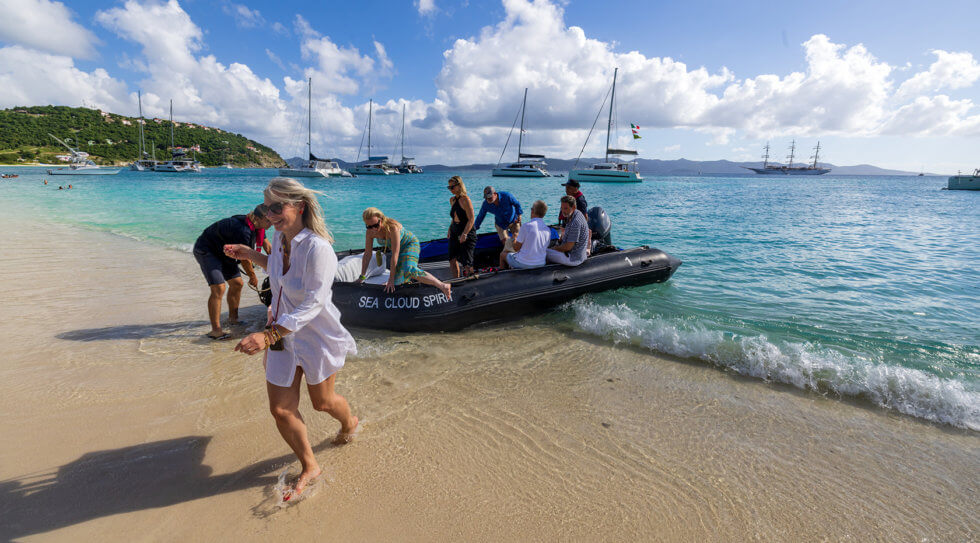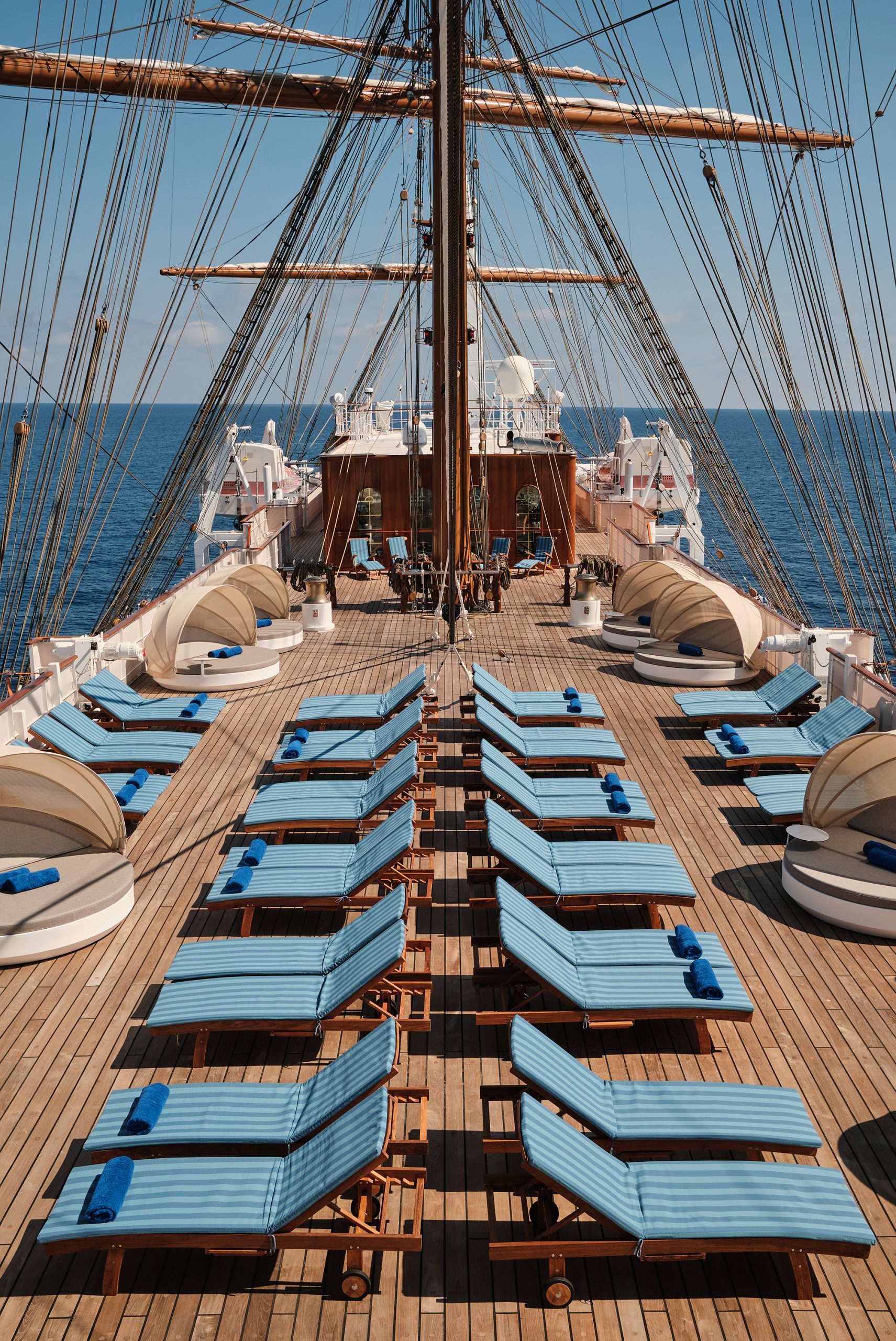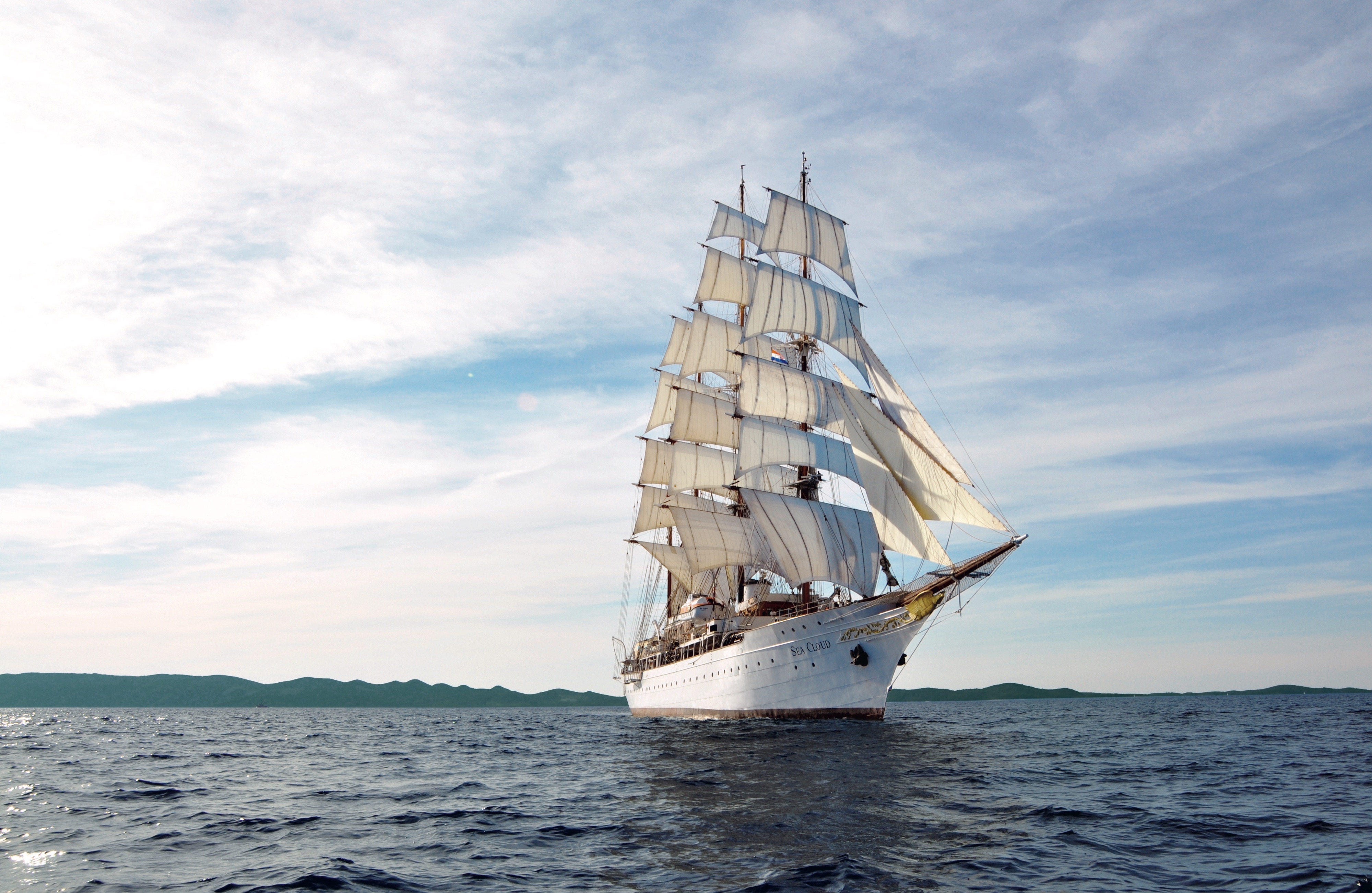Itinerary
The capital of Dutch St. Maarten stretches about a mile (1½ km) along an isthmus between Great Bay and the Salt Pond and has five parallel streets. Most of the village’s dozens of shops and restaurants are on Front Street, narrow and cobblestone, closest to Great Bay. It’s generally congested when cruise ships are in port, because of its many duty-free shops and several casinos. Little lanes called steegjes connect Front Street with Back Street, which has fewer shops and considerably less congestion. Along the beach is a ½-mile-long (1-km-long) boardwalk with restaurants and several Wi-Fi hot spots.Wathey Square (pronounced watty) is in the heart of the village. Directly across from the square are the town hall and the courthouse, in a striking white building with cupola. The structure was built in 1793 and has served as the commander’s home, a fire station, a jail, and a post office. The streets surrounding the square are lined with hotels, duty-free shops, restaurants, and cafés. The Captain Hodge Pier, just off the square, is a good spot to view Great Bay and the beach that stretches alongside.
You can easily explore all of Gustavia during a two-hour stroll. Some shops close from noon to 3 or 4, so plan lunch accordingly, but stores stay open past 7 in the evening. Parking in Gustavia is a challenge, especially during vacation times. A good spot to park is rue de la République, alongside the catamarans, yachts, and sailboats.
Bequia is a Carib word meaning “island of the cloud.” Hilly and green with several golden-sand beaches, Bequia is 9 miles (14½ km) south of St. Vincent’s southwestern shore; with a population of 5,000, it’s the largest of the Grenadines. Although boatbuilding, whaling, and fishing have been the predominant industries here for generations, sailing has now become almost synonymous with Bequia. Admiralty Bay is a favored anchorage for both privately owned and chartered yachts. Lodgings range from comfortable resorts and villas to cozy West Indian—style inns. Bequia’s airport and the frequent ferry service from St. Vincent make this a favorite destination for day-trippers, as well. The ferry docks in Port Elizabeth, a tiny town with waterfront bars, restaurants, and shops where you can buy handmade souvenirs—including the exquisitely detailed model sailboats that are a famous Bequia export. The Easter Regatta is held during the four-day Easter weekend, when revelers gather to watch boat races and celebrate the island’s seafaring traditions with food, music, dancing, and competitive games.To see the views, villages, beaches, and boatbuilding sites around Bequia, hire a taxi at the jetty in Port Elizabeth. Several usually line up under the almond trees to meet each ferry from St. Vincent.
Nutmeg, cinnamon, cloves, cocoa those heady aromas fill the air in Grenada (pronounced gruh-nay-da). Only 21 miles (33½ km) long and 12 miles (19½ km) wide, the Isle of Spice is a tropical gem of lush rain forests, white-sand beaches, secluded coves, exotic flowers, and enough locally grown spices to fill anyone’s kitchen cabinet. St. George’s is one of the most picturesque capital cities in the Caribbean, St. George’s Harbour is one of the most picturesque harbors, and Grenada’s Grand Anse Beach is one of the region’s finest beaches. The island has friendly, hospitable people and enough good shopping, restaurants, historic sites, and natural wonders to make it a popular port of call. About one-third of Grenada’s visitors arrive by cruise ship, and that number continues to grow each year. Grenada’s capital is a bustling West Indian city, much of which remains unchanged from colonial days. Narrow streets lined with shops wind up, down, and across steep hills. Brick warehouses cling to the waterfront, and pastel-painted homes rise from the waterfront and disappear into steep green hills. The horseshoe-shaped St. George’s Harbour, a submerged volcanic crater, is arguably the prettiest harbor in the Caribbean. Schooners, ferries, and tour boats tie up along the seawall or at the small dinghy dock. The Carenage (pronounced car-a-nahzh), which surrounds the harbor, is the capital’s center. Warehouses, shops, and restaurants line the waterfront. The Christ of the Deep statue that sits on the pedestrian plaza at the center of The Carenage was presented to Grenada by Costa Cruise Line in remembrance of its ship, Bianca C, which burned and sank in the harbor in 1961 and is now a favorite dive site. An engineering feat for its time, the 340-foot-long Sendall Tunnel was built in 1895 and named for Walter Sendall, an early governor. The narrow tunnel, used by both pedestrians and vehicles, separates the harbor side of St. George’s from the Esplanade on the bay side of town, where you can find the markets (produce, meat, and fish), the Cruise Ship Terminal, the Esplanade Mall, and the public bus station.
The oldest town in St. Lucia and the island’s former French colonial capital, Soufrière was founded by the French in 1746 and named for its proximity to the volcano of the same name. The wharf is the center of activity in this sleepy town (population, 9,000), particularly when a cruise ship anchors in pretty Soufrière Bay. French colonial influences are evident in the second-story verandahs, gingerbread trim, and other appointments of the wooden buildings that surround the market square. The market building itself is decorated with colorful murals. Soufrière, the site of much of St. Lucia’s renowned natural beauty, is the destination of most sightseeing trips. This is where you can get up close to the iconic Pitons and visit colonial capital of St. Lucia, with its “drive-in” volcano, botanical gardens, working plantations, waterfalls, and countless other examples of the natural beauty for which St. Lucia is deservedly famous.
Located beside the island’s only natural harbour, the capital of Barbados combines modern and colonial architecture with glorious palm tree-lined beaches and a number of historical attractions. Experience the relaxed culture of the city renowned for its British-style parliament buildings and vibrant beach life, and seek out the Anglican church and the 19th-century Barbados Garrison. The distance between the ship and your tour vehicle may vary. This distance is not included in the excursion grades.
Ship features
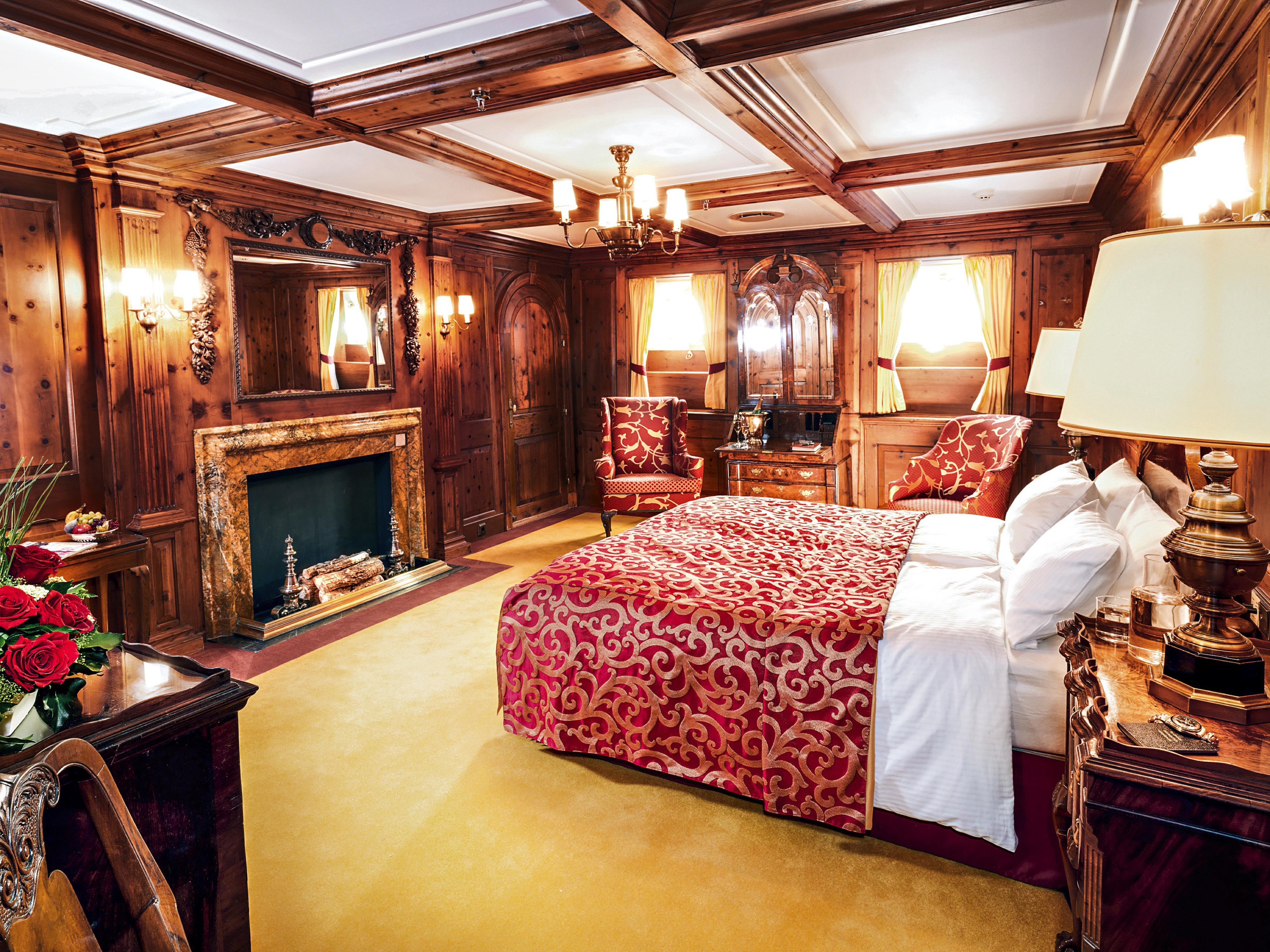
Luxury Owner's Cabin (Cat. A)
Cabin 1 – Probably the most legendary ship’s cabin ever. Marjorie has furnished the luxury suite herself. Whenever she traveled with the SEA CLOUD, these rooms were her home. Fireplace and bathroom in white Carrara marble, gold-plated swan necks as fittings, valuable Louis Philippe chairs, a large bed of varnish in old white decorated with gold, elaborate ceiling ornaments and a room-high dressing mirror: the furnishings she selected with exquisite taste reflect the successful American entrepreneur’s desire to spend time on her private yacht in a luxurious ambience.
Cabin 2 – In addition to her exquisite taste, Marjorie’s attention to detail is evident in the interior of the owner’s cabins. This is also reflected in the suite of her first husband Edward Hutton, who gave her the unique SEA CLOUD as a gift. The maple wood panelling gives the cabin a feeling of warmth and solidity; the light coffered ceiling gives the room a certain lightness. Special highlight: Edward Hutton’s beautiful “Bureau Bookcase” secretary with mirrored glass.
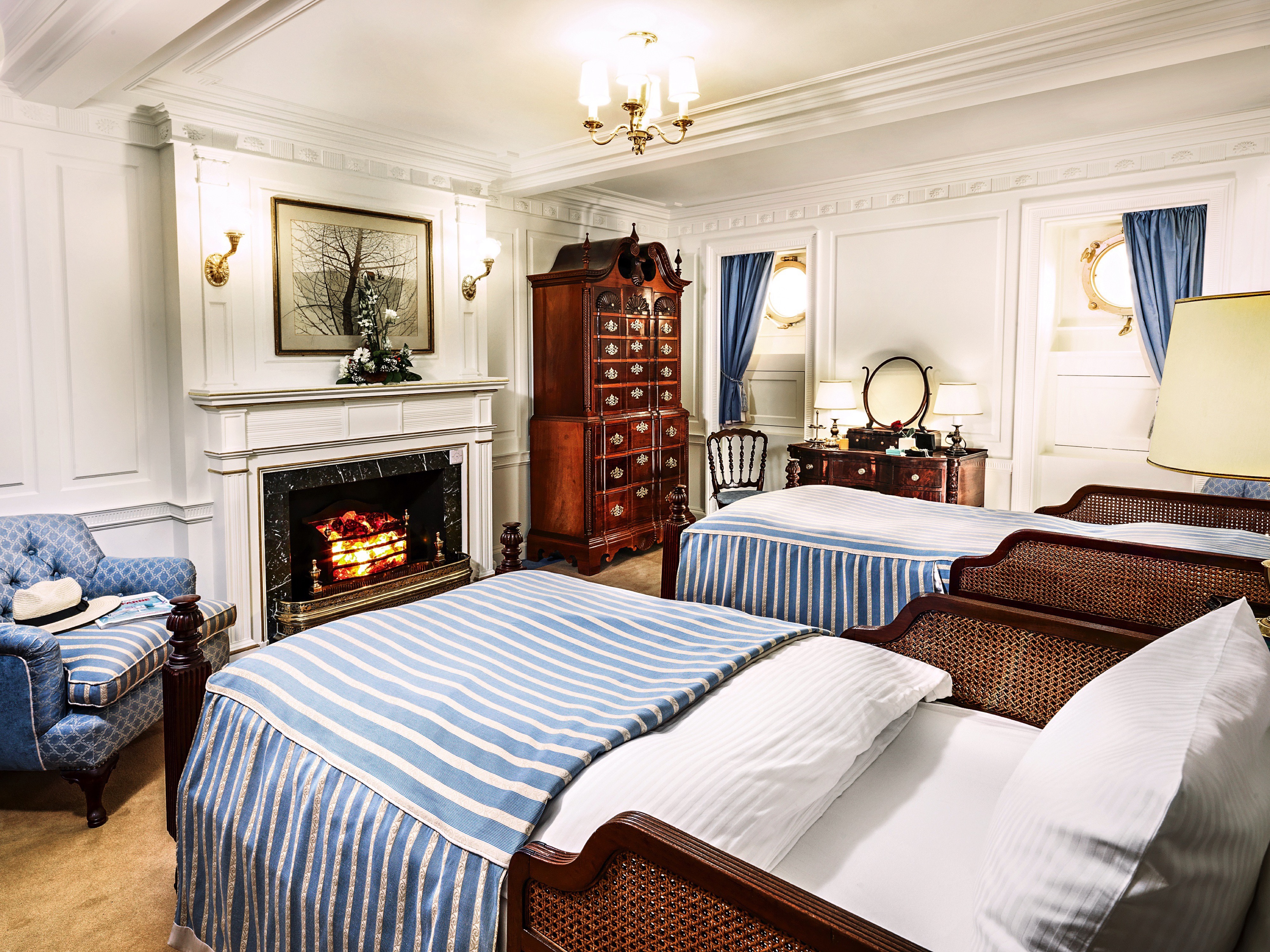
Deluxe Original Cabin (Cat. B)
Cabin 3 – The original guestrooms reflected the generous hospitality of the Huttons. Each of these cabins was individually designed with carefully selected furniture and precious materials. The original colonial-style cabin no. 3 with its comfort is a testimony to this tradition. Famous personalities from the nobility, business and show business have already bedded their heads in this and the other spacious original cabins.
Cabin 4 – During the construction period of the SEA CLOUD in Kiel and later, when Marjorie already lived on board, she collected precious antiques all over the world. The original cabin No. 4 is one of the many examples of how skillfully she integrated the valuable pieces into the interior of her private yacht.
Cabin 5 – Marjorie’s declared goal was to make her family and her guests feel at home every minute on board the SEA CLOUD. Accordingly, she has designed the rooms like this de luxe original cabin to be spacious and comfortable. Spacious antique mahogany chests of drawers, marble in the bathroom and by the fireplace and antique unique pieces spread a cosy elegance.
Cabin 6 – Every vacation on the SEA CLOUD is also a journey through time. As in all original cabins, in this de luxe cabin you will feel transported back to the time of the elegant world customer of the 1930s. The selected antique mahogany furniture is small and delicate. Thanks to the color selection of the fabrics, the room has an extremely warm, sunny and light atmosphere.
Cabin 7 – As the first owner, Marjorie also furnished the SEA CLOUD with so much love for detail because she wanted to offer her daughter Dina Merrill a wonderful and safe home on board. This is especially noticeable in cabin no. 7: here Dina spent a large part of her childhood. The furniture made of fine maple has mahogany inlays. The unusual floor plan with the sloping fireplace makes the cabin appear even larger.
Cabin 8 – The original guestrooms reflected the generous hospitality of the Huttons and still contain the soul of the SEA CLOUD. Cabin no. 8 is a fine example for the character of the exclusive private yacht as which the ship was designed from the very beginning.
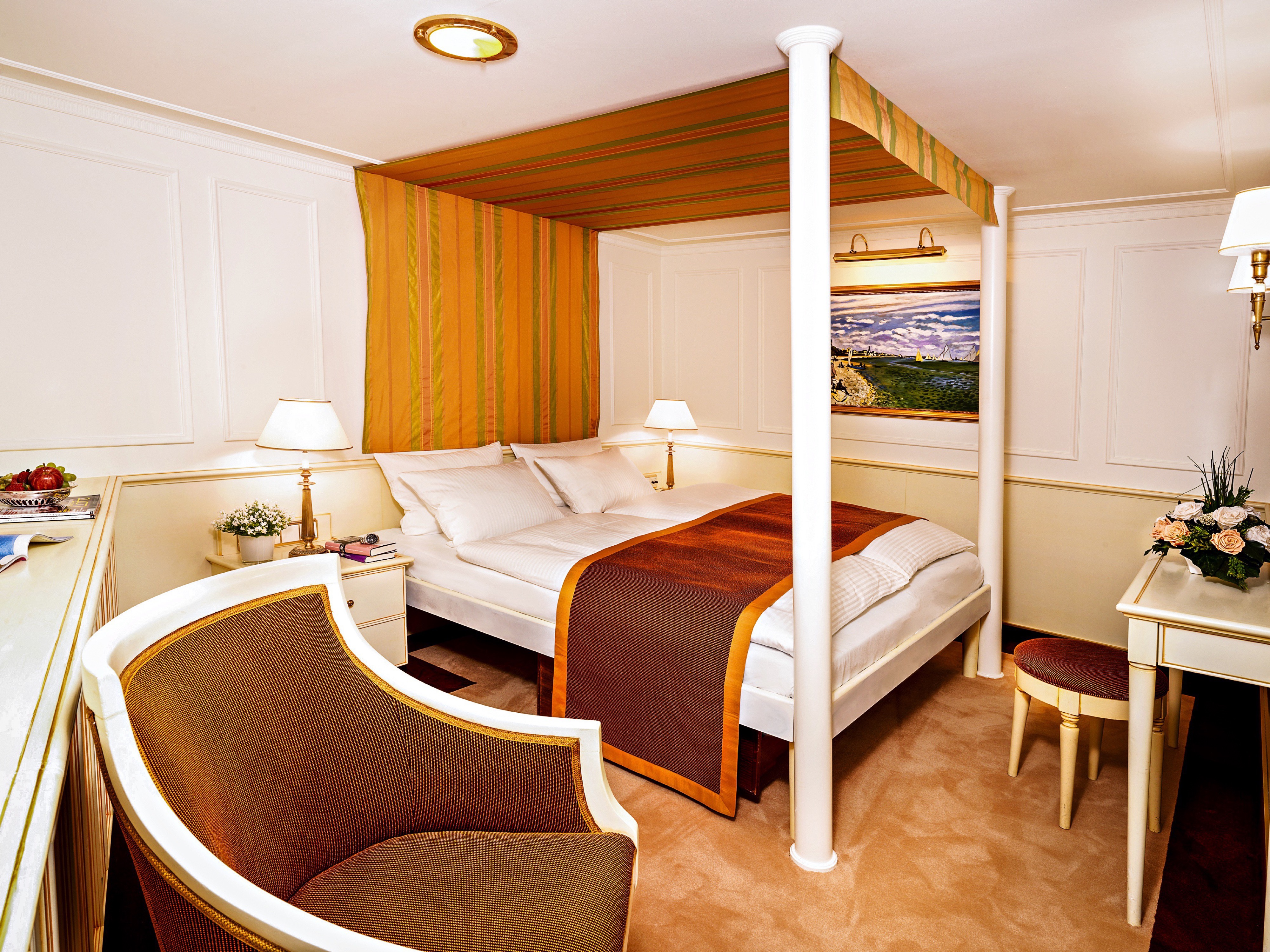
Deluxe Original Cabin (Cat. C)
Cabins 9 and 10 are located in the original area on the main deck. Both rooms were redesigned into large De-Luxe outside cabins. The design is based on historical models with a modern accentuation and is kept in warm fabrics and wood tones. Both cabins are located at the end of the original area and are connected to the promenade deck by a separate staircase.
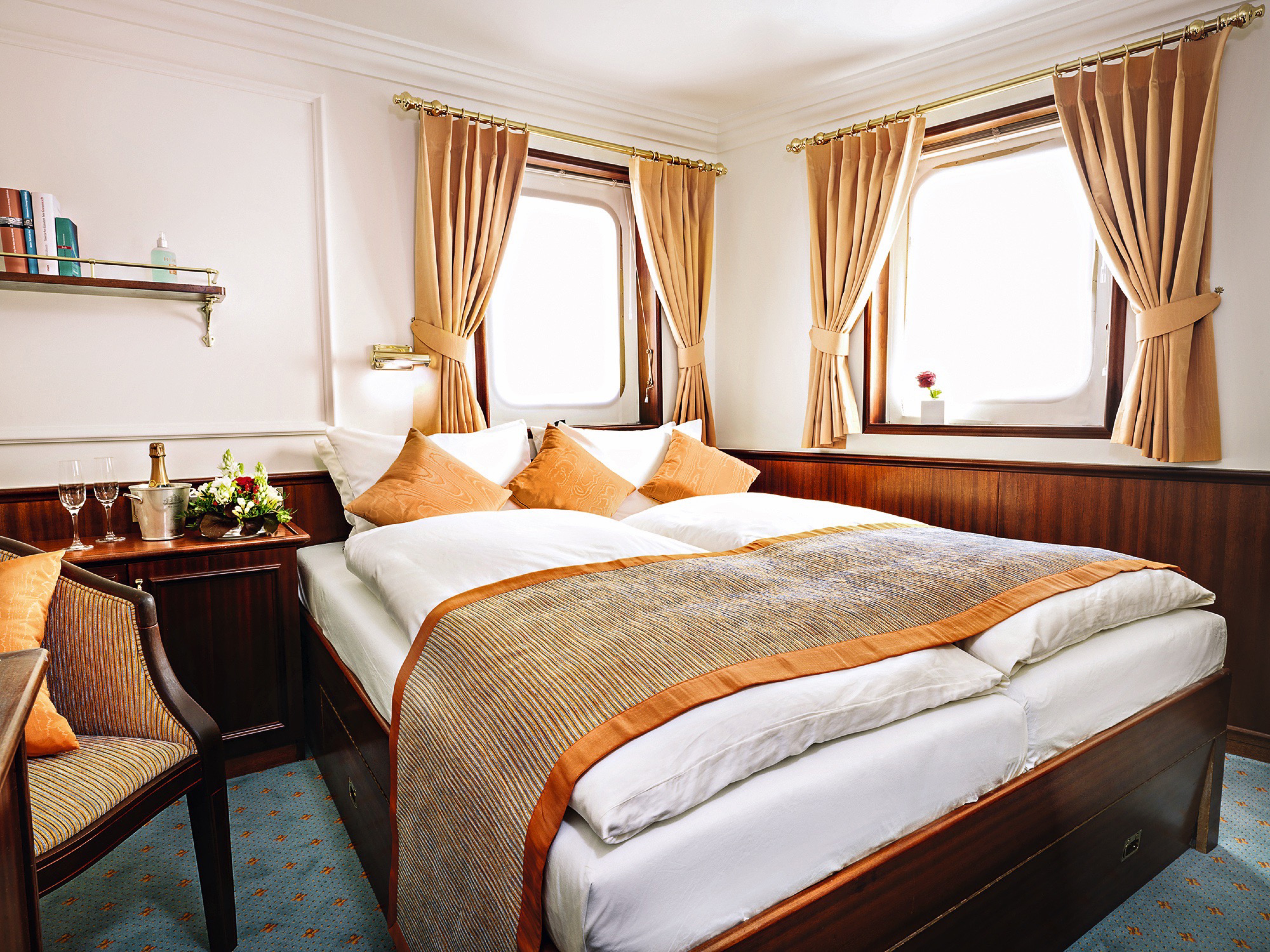
Double-Bed Cabins (Cat. 1)
Like all the cabins on the captain’s and lidodeck, these two rooms were only built in the late 1970’s and offer a great deal of comfort. Their outstanding feature is the panoramic windows placed over the corners, which make the overall impression bright and friendly.
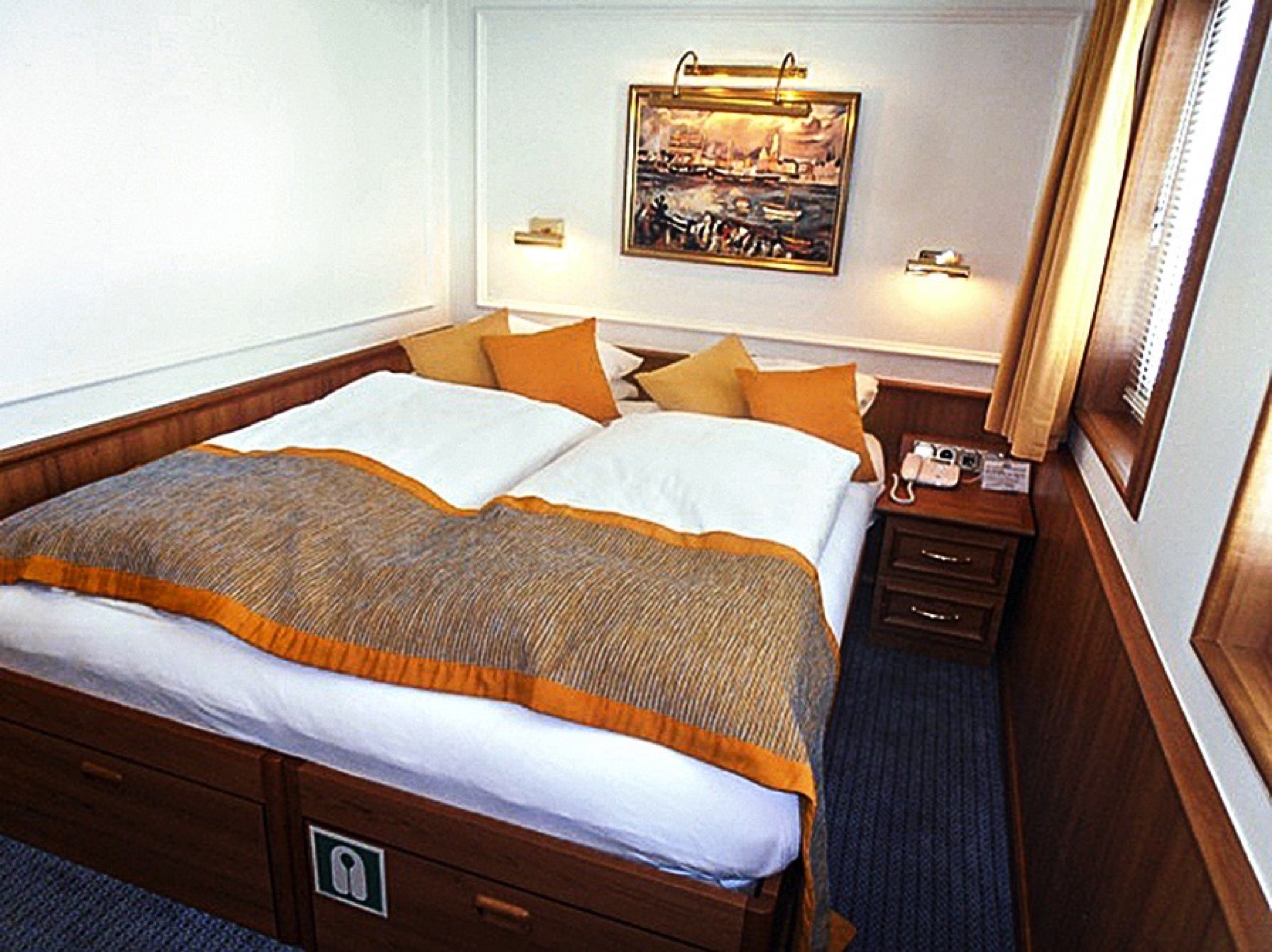
Twin-Bed Cabins (Cat. 2)
Even though the cabins on the captain’s and lidodeck were harmoniously integrated into the SEA CLOUD only later, they naturally follow the standards set in the original area. Their tasteful interior design is a contemporary interpretation of the interior designed by Marjorie Merriweather in the 1930s. The comfortable interior corresponds with the wonderful view of the wide sea.
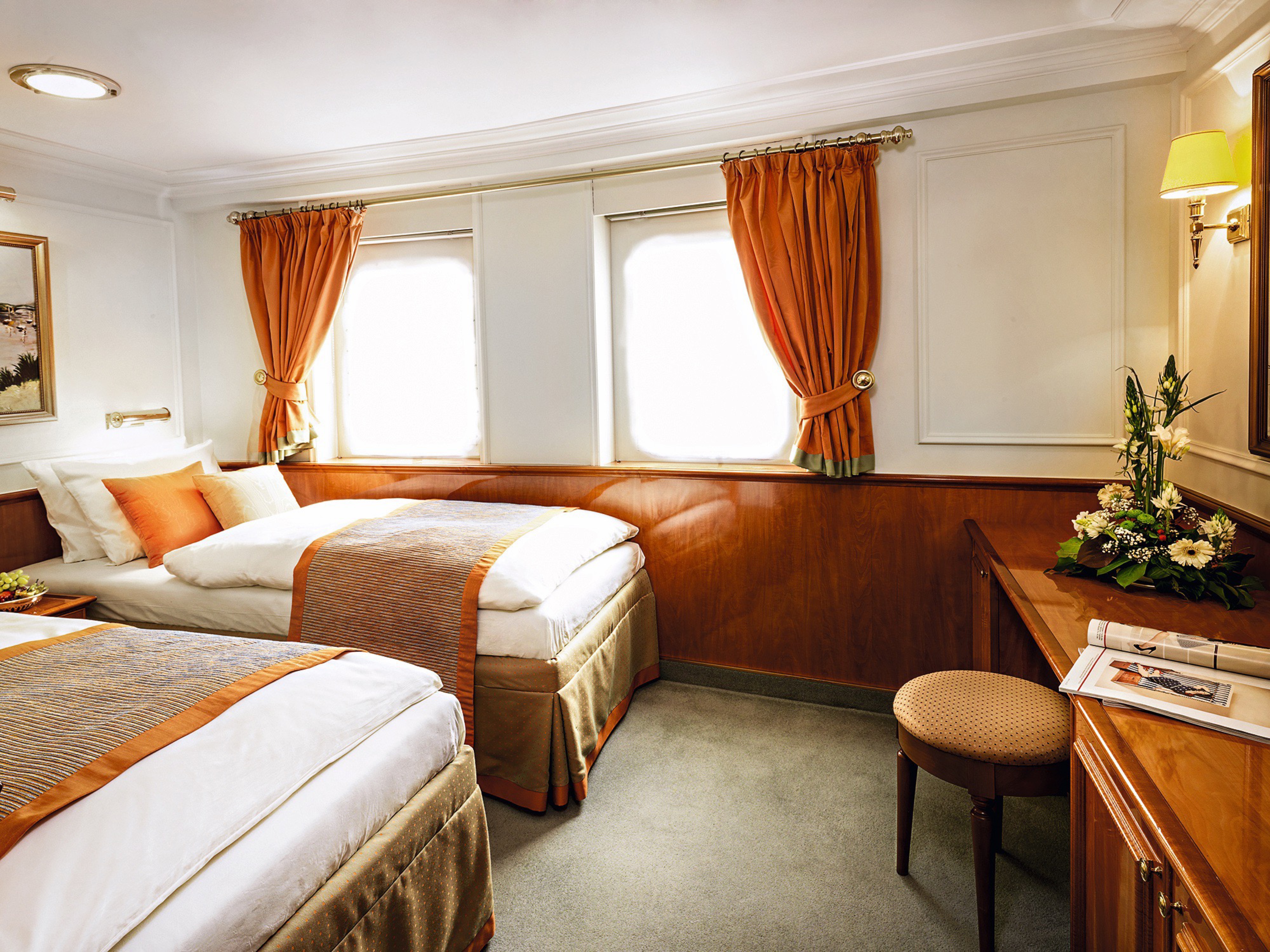
Twin-Bed Cabins (Cat.3)
These comfortable cabins have a special maritime charm due to their location between the manoeuvring stations for hoisting and lowering the sails. The deckhouse, which was added during the renovation of the SEA CLOUD, is an oasis of peace, but due to its location on the promenade deck, the cabins are also only one step away from the restaurant and lounge in the superstructure amidships.
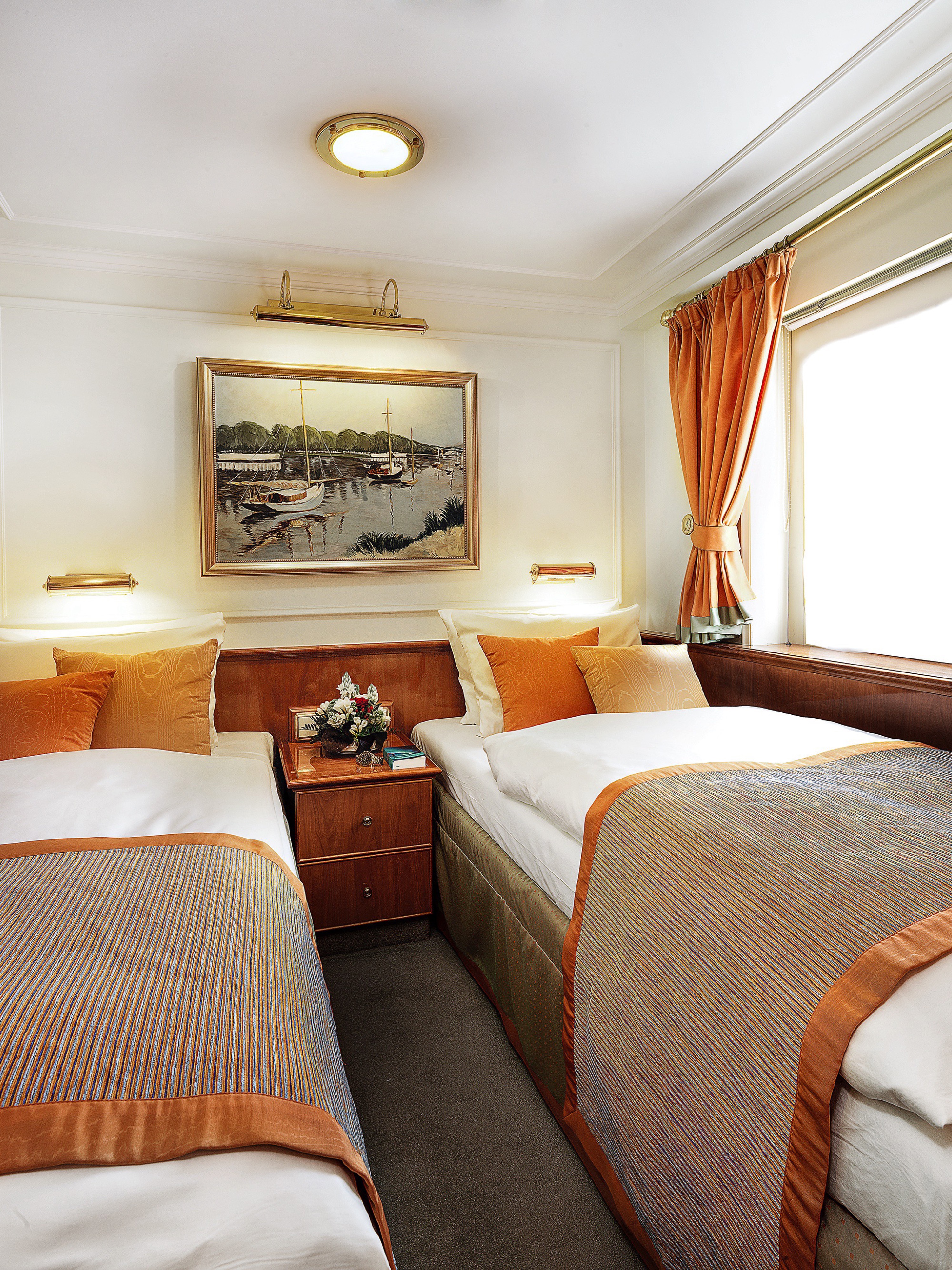
Twin Bed Cabins (Cat. 4)
In addition to the comfort and luxury that characterize the SEA CLOUD, both cabins offer a special feature: the most charming place on the tall ship – the so-called Blue Lagoon – can be reached directly from them. The semi-circular, blue cushions that give the place its name are the traditional place on board for relaxing sunbathing or – at night – for a dreamy view of the impressive starry sky above the ocean.
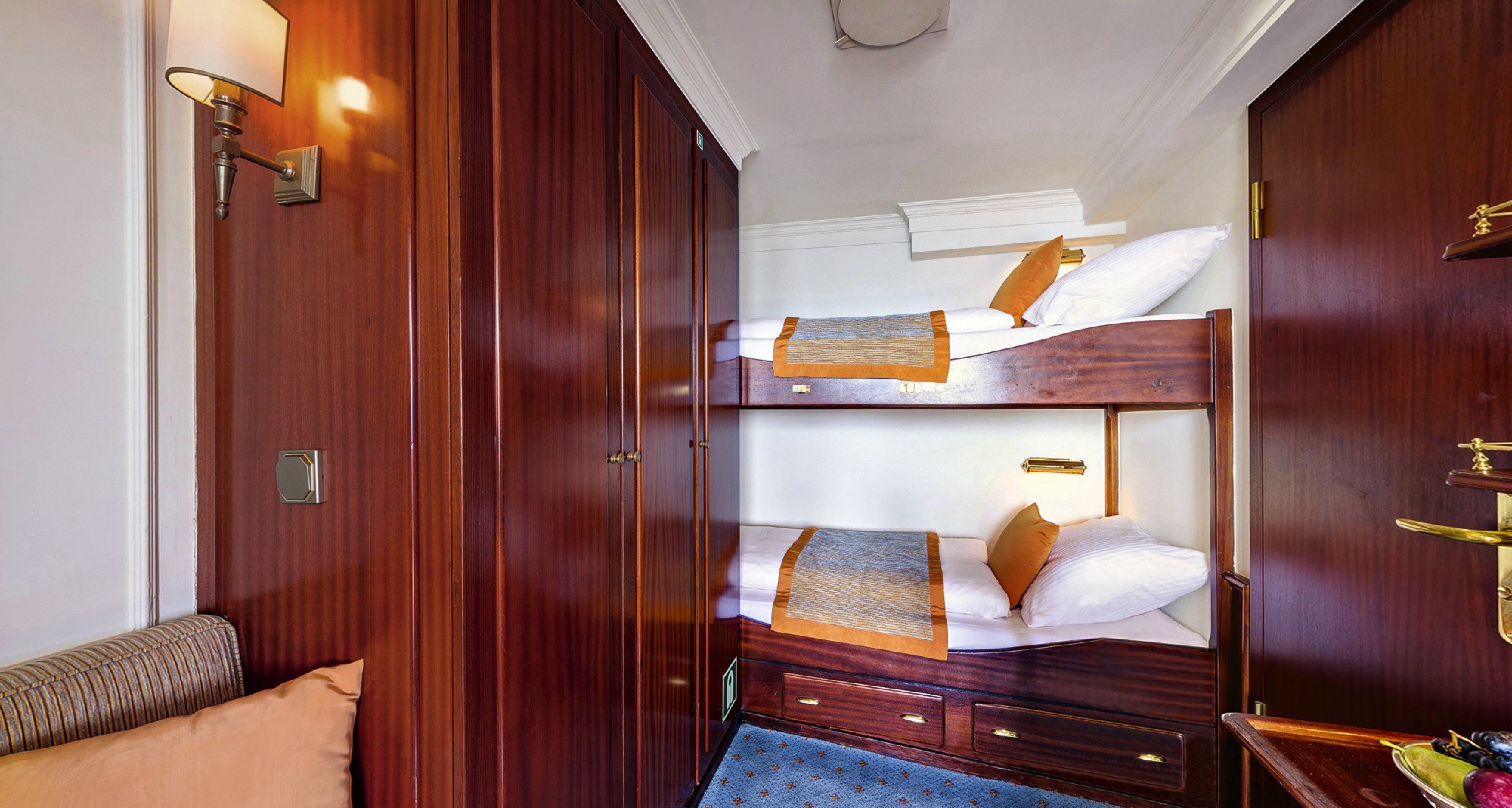
Upper-/Lower-Bed Cabins (Cat. 5)
These cabins are the right place for sailing enthusiasts. In Marjorie’s time, the officers of the SEA CLOUD were accommodated here. Their furnishings are correspondingly nautical. The clou: The doors of the cabins below the bridge deck lead directly to the promenade deck, so that at night you can sleep in the perfect maritime ambience with open doors and fresh air.

Guarantee Cabins
Guaranteed double cabins: The range of accommodation starts from Cat. 5. You will receive your exact cabin number when arriving on board. The allotment for this category is very limited.
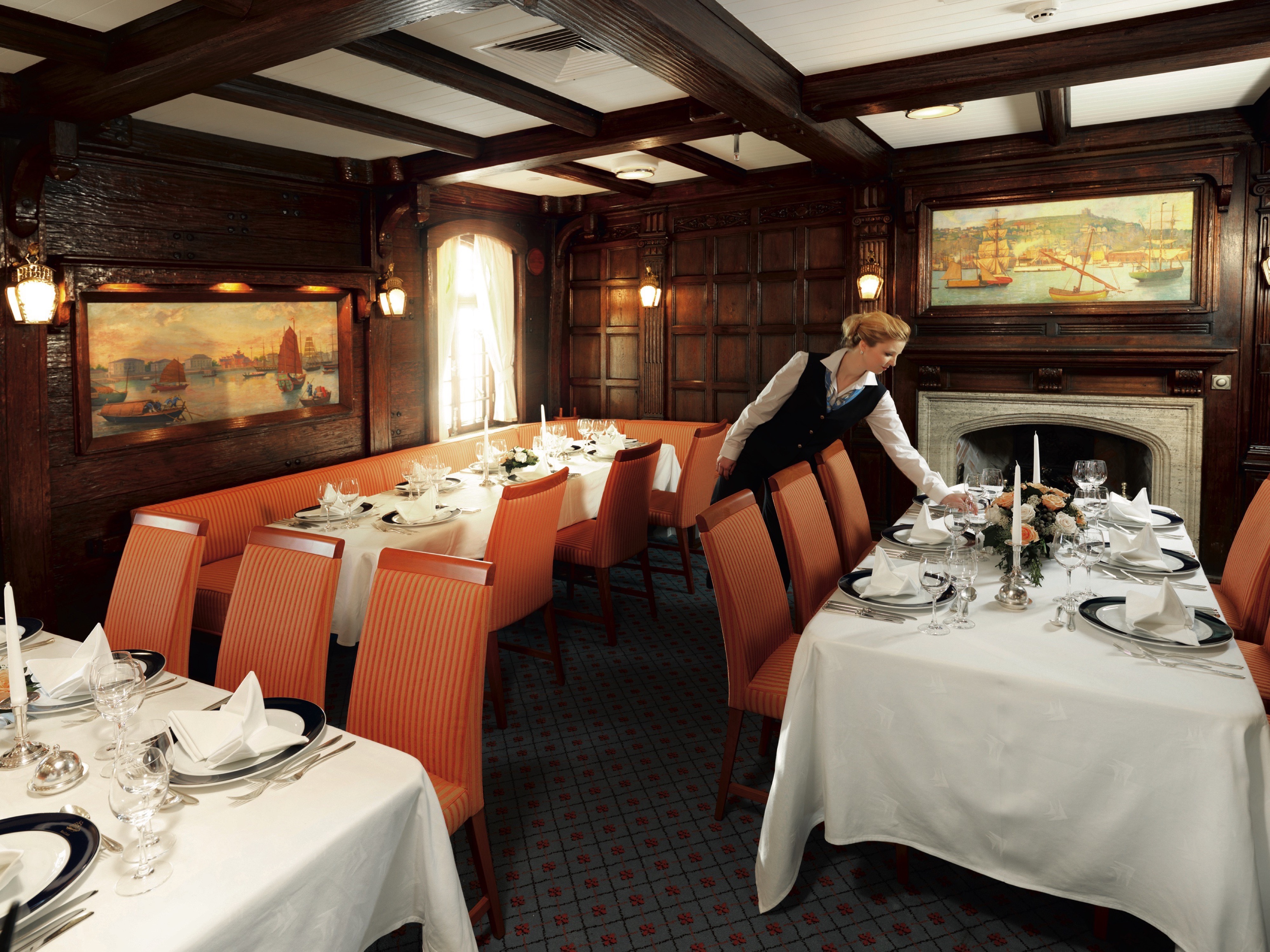
Dining On Board
Sea Cloud’s dining room is panelled in warm woods and hung with original oil paintings. It is on the Promenade Deck, in Sea Cloud’s former salon, where Marjorie Merriweather Post received her guests. The chefs come from renowned, first-class restaurants, and offer fresh, contemporary cuisine inflected with regional flavours. They use fresh ingredients sourced locally, from sustainable providers whenever possible. By adding local flavours to a menu that also includes traditional favourites, the chefs aim to give you a greater sense of the cuisine and culture in the region you’re exploring. An array of fresh fruits and delicious, fresh juices are key components of the breakfast buffet. Wines from well-known regions are served with lunch and dinner, and are included in the expedition price. There are fish or meat choices at every meal.
There’s no assigned seating in the dining room; in fact, many tables accommodate uneven numbers. This makes for easy mingling and the fun of sharing breakfast, lunch, or dinner with different new friends, or staff. And independent travellers can count on a welcome everywhere they turn.
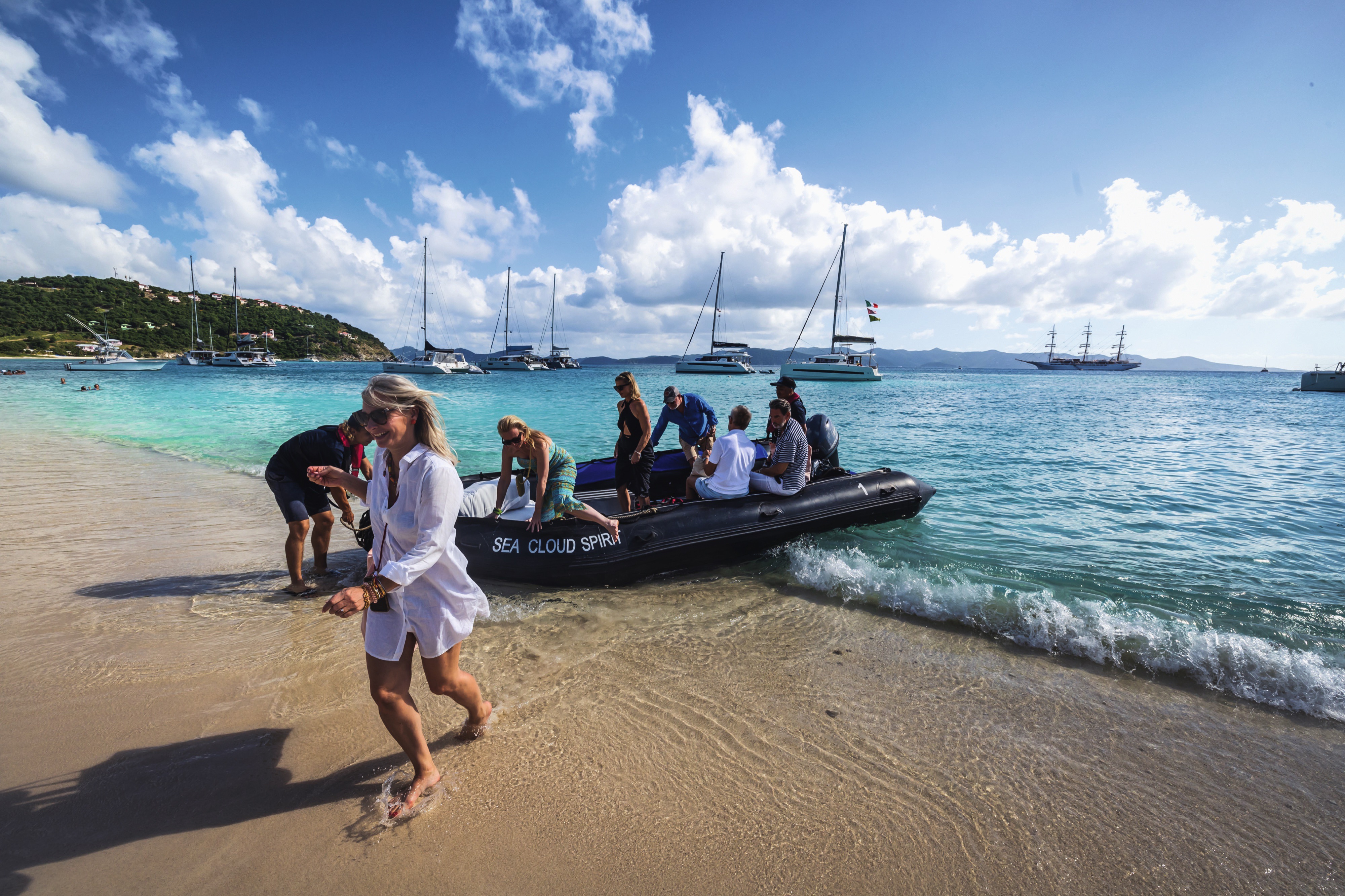
Zodiacs
Smaller ships, greater possibilities
Among the many joys of travelling smaller: a quick spin on a zodiac, enjoying the beach barbeques in secluded bays, photo safaris, pausing for a dip in the azure sea. And on selected tours, some exclusive experiences are included – a private concert, an opera house or a palace tour, a culinary visit to a special vineyard, or a front-row seat at a legendary regatta.
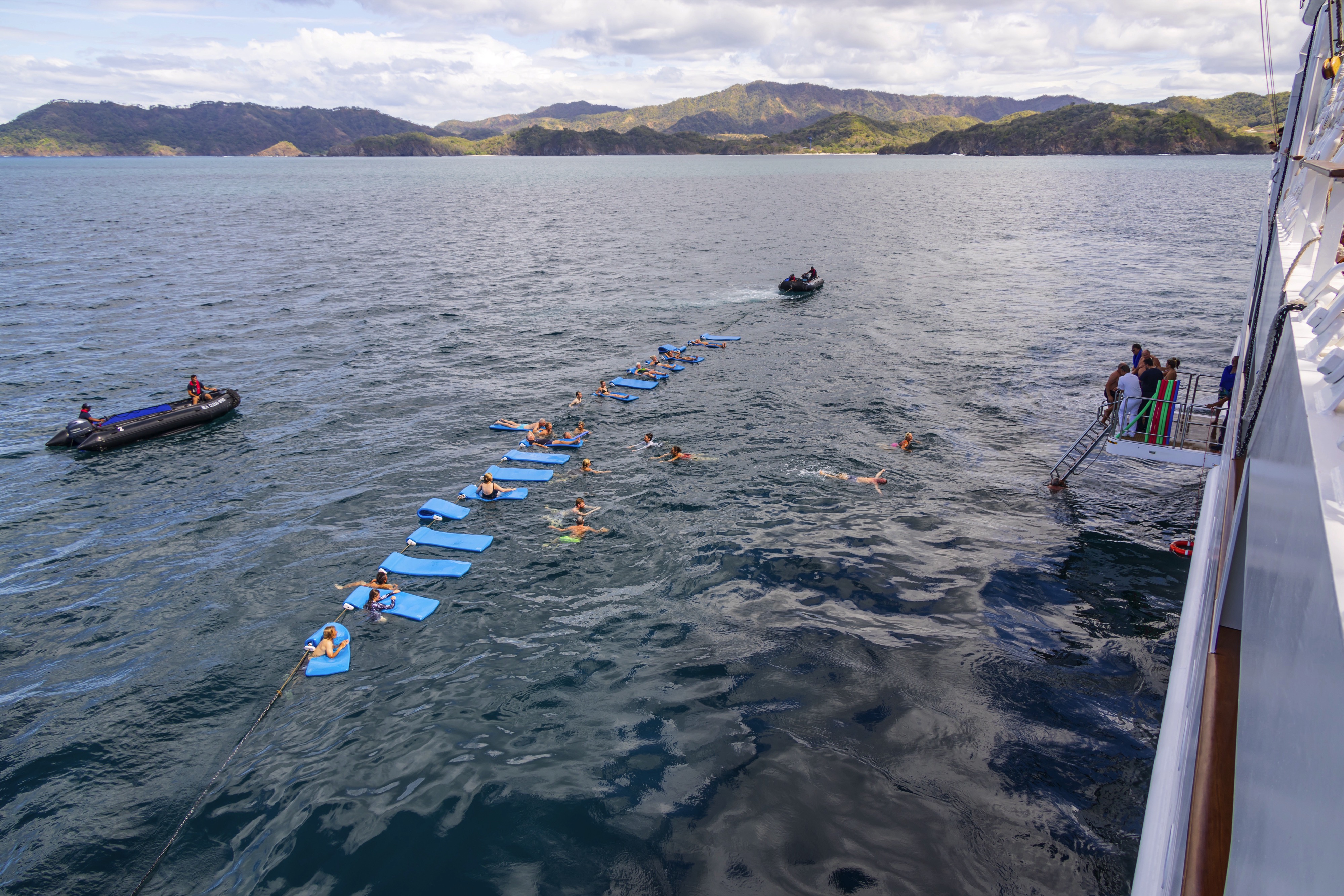
Watersports
Dive in and be active
Whether you want to start your swim directly from the ship or explore the colorful world on the reef – water sports are even more fun under the Caribbean sun. Equipment is available for everyone: Snorkels, fins and stand-up paddles are waiting for you. If you are in the mood for even greater action, let yourself be glided across the crystal clear waters by tubing in the Caribbean.
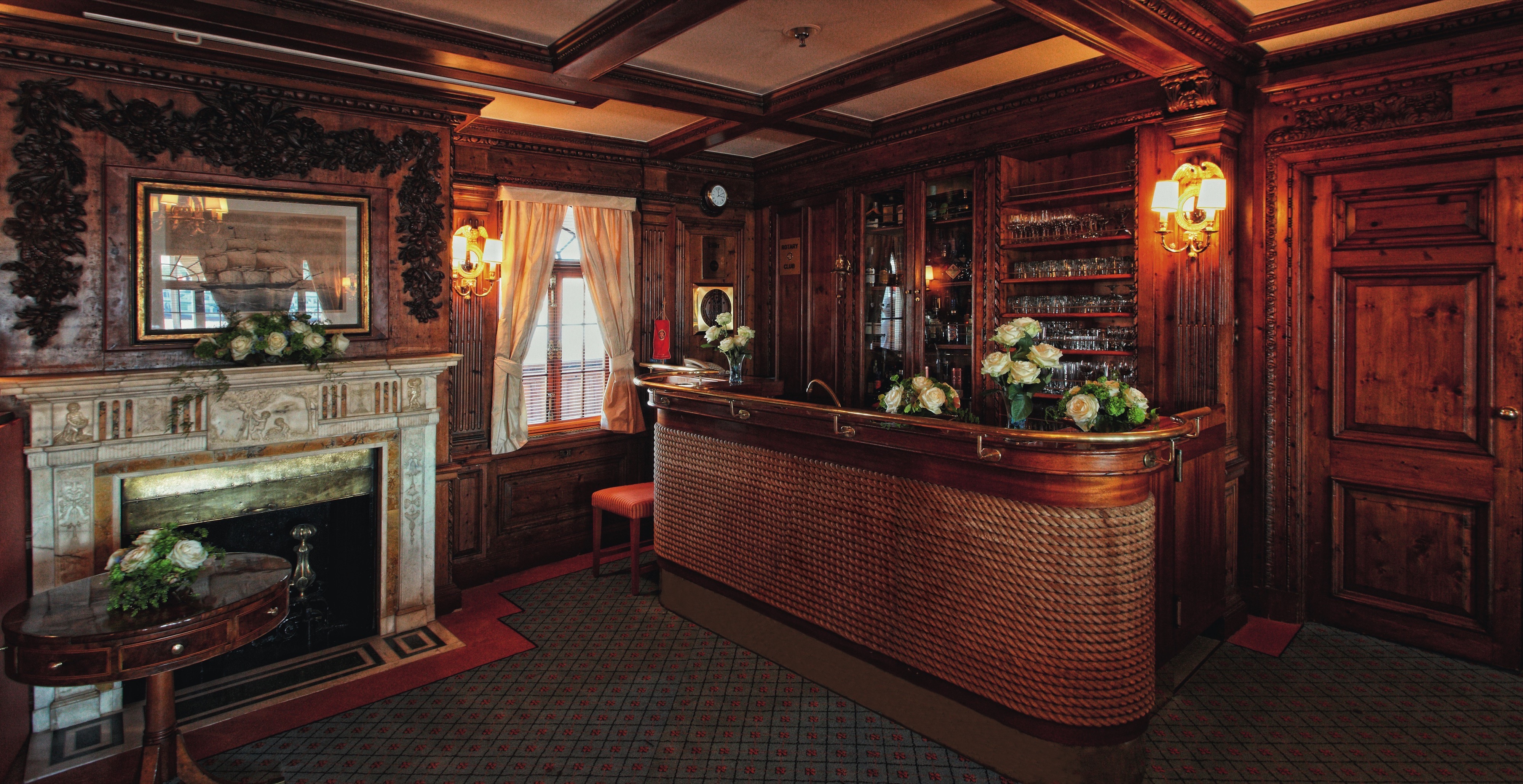
The Lounge
Selected picture books, high-quality literature, popular board games and a writing desk with a laptop can all be found in the cosy lounge on the promenade deck.
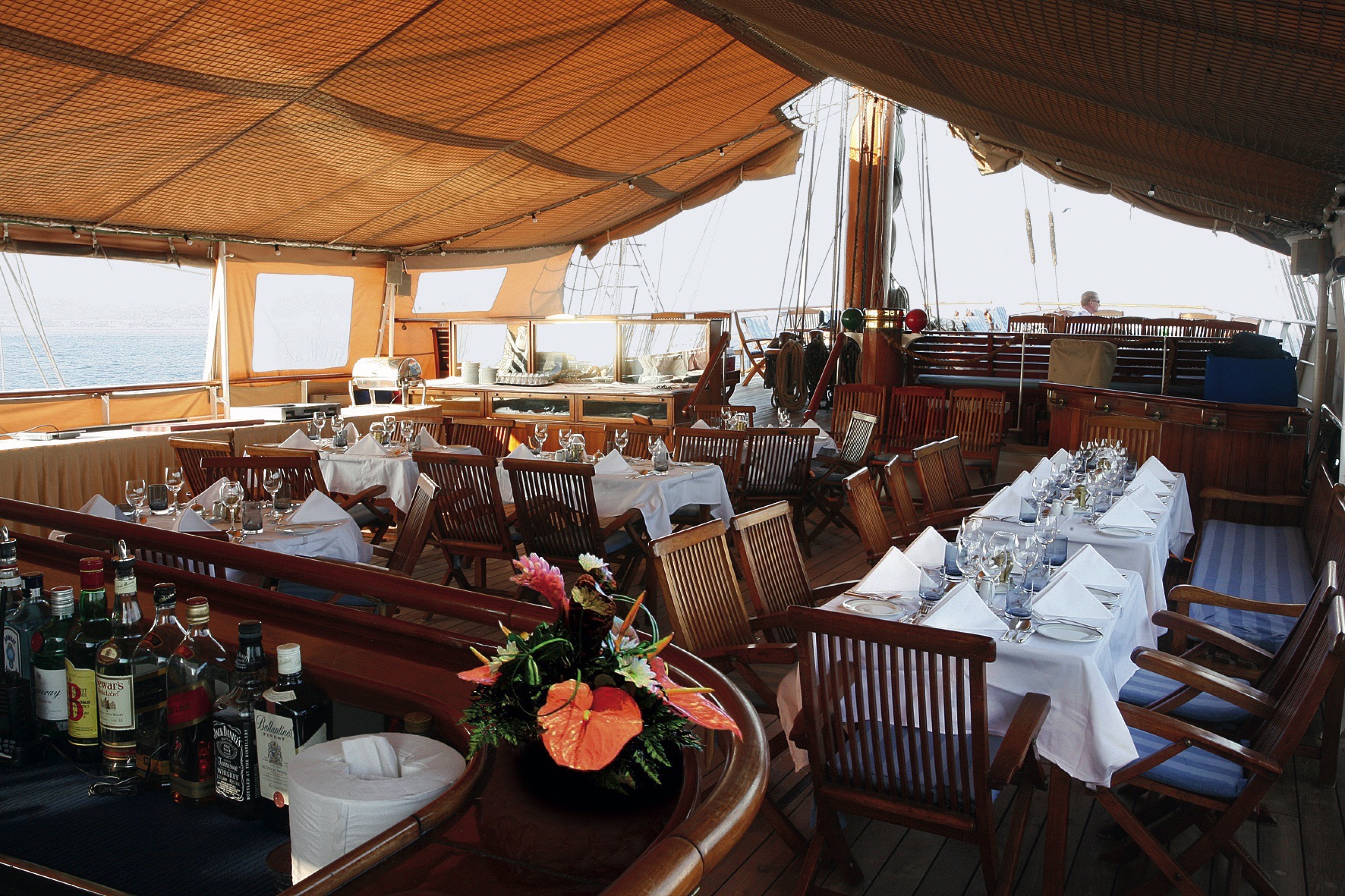
The Lido and Promenade Deck
If the weather is fine, you might like to sit on the lido deck at lunch time. The tasty snacks served at the buffet in the open air will both whet and satisfy your appetite. At certain times, our onboard pianist will provide pleasant background music to your conversations. The lido bar is a cosy place to wind down the evening. Quite befitting for any traditional sailing ship, the atmosphere can also get rather vibrant when the Crew Shanty Choir makes an appearance.
Not only is the promenade deck a quick route from one end of the ship to the other; in good weather, you will also find some very tasty refreshments there. The coffee, tea and light snacks are ideal for those who rise early, but also to provide sustenance in the afternoon between meals. Just imagine a freshly made waffle with ice cream under the white sails of a ship – that really is pure paradise!
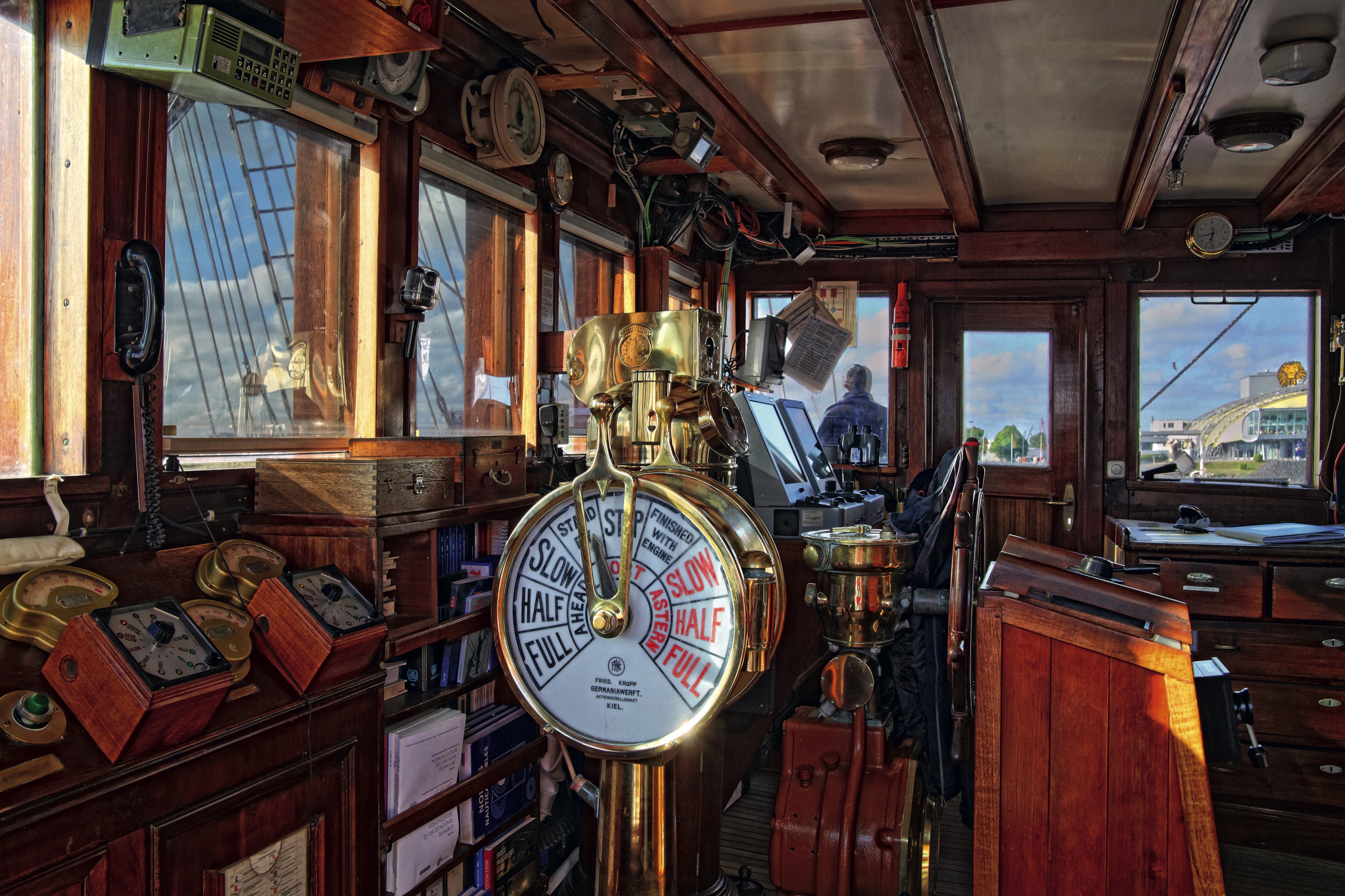
Bridge
Excellent views of the sea and the 30 majestic sails can of course be enjoyed from the SEA CLOUD’s bridge, where a range of historic nautical instruments almost conceal the modern technology. Operational circumstances permitting, the officers on the bridge will also be happy to answer questions about “their” sailing ship.
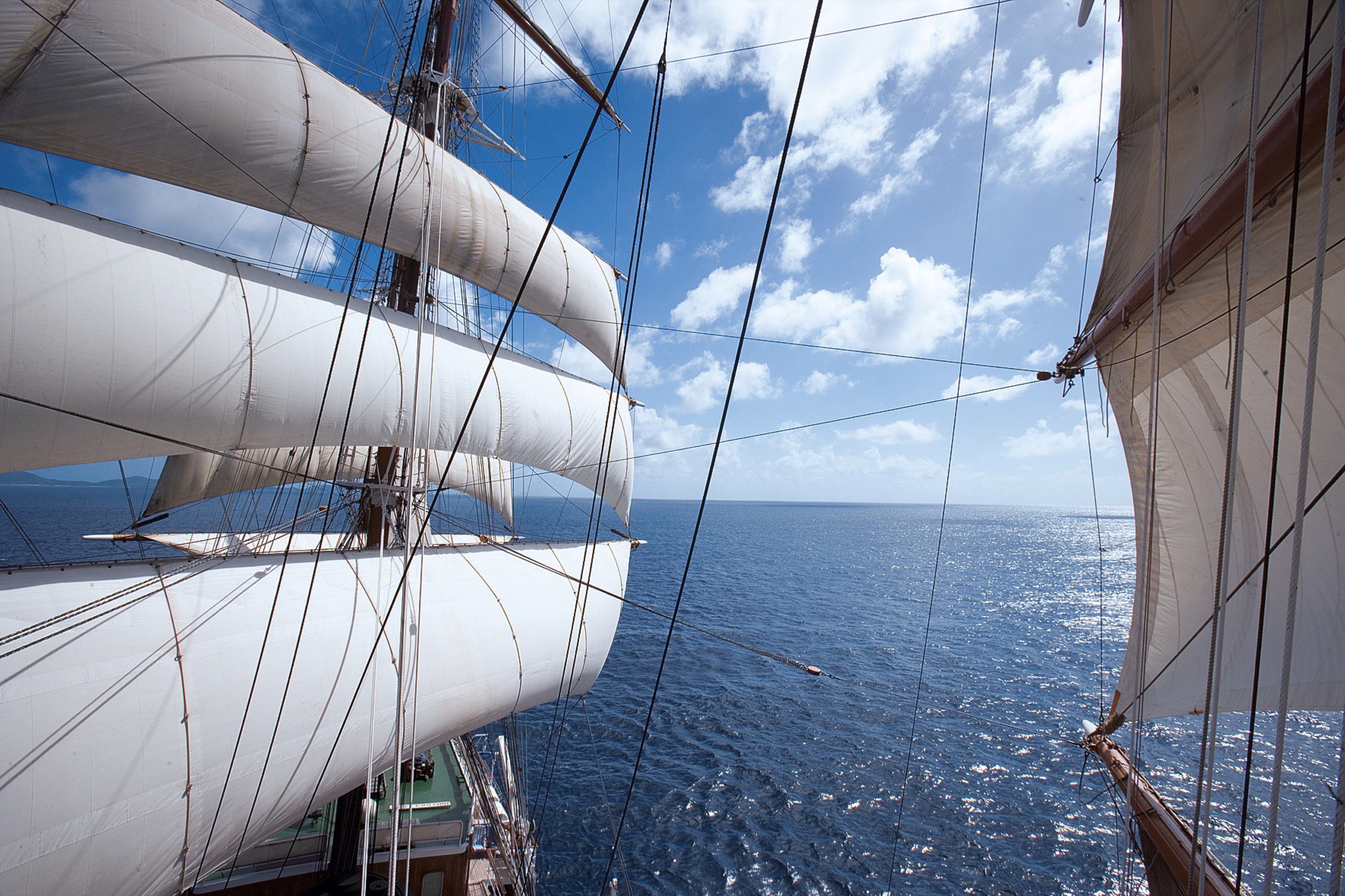
On-Board Life
On board the SEA CLOUD there are many wonderful spots where you can relax and unwind: from countless deckchairs, to elegant mahogany benches and the blue lagoon, where you can gaze up at the masts. Watching the movement of the sails and all the traditional tasks associated with a majestic sailing ship is one of the most wonderful activities on the high seas. The traditional rules of cruise travel might be thrown overboard; on board the SEA CLOUD you can travel the way you prefer. If you like, you can jog around the outer promenade deck or borrow snorkelling equipment for a trip ashore. The SEA CLOUD’s onboard zodiac boats do not just take you ashore and back but are also used to tow “Fun Island”, our inflatable water sled. And when conditions are calm enough, the gangway becomes a direct access point for the most beautiful swimming pool in the world: the sea.
Special Dietary Requirements
The chef will happily accommodate special diet requests—please let us know about any requests in advance so that we may prepare.
Dress Code
During the day, and depending on the weather, a sophisticated summer look is suitable. For the evening, we recommend smart-casual wear. We also kindly request that guests refrain from wearing shorts at evening meals. The Captain’s Dinner (an event which normally takes place twice on each trip – once on short cruises) is a time when our guests tend to opt for a more elegant look. We recommend a suit for men and appropriate smart dress for women. Please remember to take some non-slip shoes with you.
Disabled Access
Our tall ships SEA CLOUD and SEA CLOUD II are not accessible for all people with disabilities and are not suitable for wheelchair users. Please contact our cruise consultancy for further details.
Smoking Policy
Smoking is permitted only on the outer decks outside of meal times. We kindly request that smokers take the comfort of other passengers into consideration. Smoking is prohibited on the blue lagoon deck and covered areas of the spanker and lido deck at all times.
Internet Access
A laptop is available for use on board in the lounge (SEA CLOUD) or in the library (SEA CLOUD II). You can use this laptop or your own laptop to connect to the internet (Wi-Fi) using the access code, however please note that there is a charge for this. The code can be obtained from reception or the purser.
Laundry Services
Laundry services available on board are limited to washing and ironing. There is no dry-cleaning available. The washing and ironing service is provided at an additional charge and is carried out overnight. For guests with bookings in Cat. A-C (SEA CLOUD) or Cat. A+B (SEA CLOUD II), this service is free of charge. For safety reasons, passengers are not permitted to iron in their cabins.
Children on Board
Children are of course very welcome on our ships, however there is no supervision or entertainment available for children.
Sustainability & Low Impact Tourism
We approach the people and their cultures with respect in all the regions we visit, travelling mindfully through the local environment. By doing this, we can bring our guests closer – in the truest sense of the word – to these places, and what makes each one special.
THE WINDJAMMER EXPERIENCE
For you and us alike, the key attraction of our trips is the chance to sail on the open seas.
We therefore take every opportunity to set sail and be propelled by the sheer power of the wind. That is why the captain will sometimes change the route if the weather requires it. On board our SEA CLOUD tall ships, you’ll experience the elements, as many of the day-to-day activities take place outside.
HAVING AS LITTLE IMPACT AS POSSIBLE
When we do have to start the engines, we utilise low-sulphur marine diesel on all three of our windjammers.
For us, this is standard practice. Even the SEA CLOUD, our very first windjammer, was equipped with this technology right from the start. Our motto: to minimise our impact on the environment yet still make a profound and positive impression on those around us.
A SUSTAINABLE APPROACH TO LIFE ON-BOARD
Avoiding plastic, reducing water usage and protecting the environment.
These are the factors that guide us in the day to day operation of our ships and our ongoing development of eco-friendly alternatives. To cite just one example, our reusable drinks bottles are not only easy on the eye, but also easy on the environment.
QUALITY, NOT QUANTITY
Our ‘small but perfectly formed’ windjammers are able to visit smaller ports, away from the busy routes frequented by large cruise liners.
With a maximum of 64 to 136 passengers, we’re always welcomed in those locations thanks to our approach of visiting local communities rather than overwhelming them. Needless to say, our itineraries also include some classic destinations, though we usually visit these only when the mega-liners have moved on.
BOOSTING THE LOCAL ECONOMY
Procuring supplies locally, working with local, smaller-scale agencies and paying fair prices.
By taking this approach, we see ourselves as a partner for our local service providers, with whom we’ve built relationships based on trust over many years. After all, we want our voyages to benefit both our guests and the communities we visit around the world.
AUTHENTIC CUISINE
Our menus are always a true reflection of the regional cuisine.
This is because our chefs enjoy buying exotic spices, local specialities and freshly caught fish from local markets to bring you – even in a culinary sense – closer to the places we visit.
A MEMBER OF THE FUTOURIS NETWORK
Heading into the future with Futouris.
Preserving the natural and cultural heritage of our world and shaping the future of tourism in a sustainable way is what Futouris stands for. Members of the network are working globally to improve people’s living conditions, preserve biodiversity and protect the environment and climate.
Medical Facilities
All three ships have a hospital, which is supervised by a ship’s doctor. Medical consultation hours can be found in the daily program. In case of an emergency, the doctor can be reached at any time by calling 911.

Captain's and Lido Deck
- Bridge
- Lido Bar
- Lido Deck
- Spanker Deck
- Category 1 Cabins (Double Bed Cabins)
- Category 2 Cabins (Twin Bed Cabins)

Promenade Deck
- Purser
- Hospital
- Restaurant
- Lounge
- Category 3 Cabins (Twin-Bed Cabins)
- Category 4 Cabins (Twin-Bed Cabins)
- Category 5 Cabins (Upper-/Lower-Bed)

Main Deck
- Deluxe Category A Cabins (Luxury Owner’s Cabins)
- Deluxe Category B Cabins (De Luxe Original Cabins)
- Deluxe Category C Cabins (De Luxe Outside Cabins)
